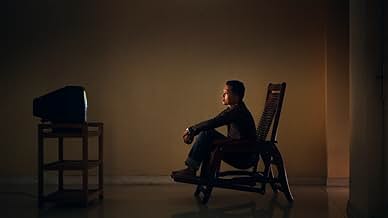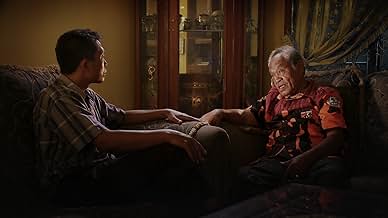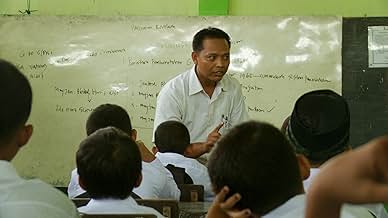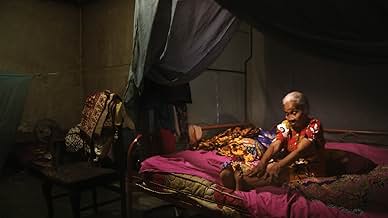Una famiglia che è sopravvissuta al genocidio in Indonesia si confronta con gli uomini che hanno ucciso uno dei loro fratelli.Una famiglia che è sopravvissuta al genocidio in Indonesia si confronta con gli uomini che hanno ucciso uno dei loro fratelli.Una famiglia che è sopravvissuta al genocidio in Indonesia si confronta con gli uomini che hanno ucciso uno dei loro fratelli.
- Candidato a 1 Oscar
- 48 vittorie e 45 candidature totali
- Self - former leader of death squad
- (filmato d'archivio)
- Self
- (voce)
- (as Josh)
- Self - Sprecher
- (voce)
- (as Achim Schülke)
- Self - reporter, NBC News
- (filmato d'archivio)
Recensioni in evidenza
Oppenheimer returns to the same material he mined in "The Act of Killing," the slaughter of communists in Indonesia in the 1960s. The men who actually supervised the killings are alive and well for the most part, and still exercise a gangsterish kind of control over the country. Communists aren't still being murdered overtly and en masse, but one senses that it would be easy for someone to "disappear" if he/she pushed too hard against authority. "The Act of Killing" stuck close to the murderers, and we watched in stunned disbelief as they gleefully reenacted their killings, the heroes of their own demented movies. "The Look of Silence" follows a man whose brother was murdered as part of the Communist purges before he was even born, and now wants to confront the men who carried out the murder. It's unclear, probably even to himself, what he wants from these confrontations. Possibly just an apology, possibly simple recognition of what they did. The conversations run the gamut from cathartic to downright frightening (one man obliquely hints that he could make very bad things happen to the film's protagonist if he wanted to). But the reaction from all of the killers is essentially the same: the past is the past (even though in Indonesia it isn't), why are you bringing all of this up again, can't we just agree to forget?
Of course agreeing to forget is what makes horrific events like these possible to repeat. The most fascinating interviews are those not with the killers themselves but with the children of the killers, the people who have inherited their parents' legacies (on both sides of the conflict) and now must make something of the world they share. In some cases, the children learn details they never before knew and we watch them process them on screen in real time. It's difficult as a viewer to know how to feel about these inheritors of their parents' actions. On the one hand, they really can't and shouldn't be held accountable for things their parents did when they were children or possibly not yet even born. On the other hand, like it or not, we all inherit our own histories and have to at least acknowledge them, both the good and the bad, if we are to learn from them.
Both "The Look of Silence" and "The Act of Killing" are infuriating to Western viewers who have been raised to believe that freedom and justice eventually triumph and that evil, either individual or systemic, gets punished. These are brilliant films, and while they certainly sow doubts in my head about the state of mankind, I feel like a better person for having seen them.
Grade: A+
What I got out of this documentary was that many of the killers didn't know what a communist was, let alone think they were people. They were spun lies about the communists and many took joy in killing them. One of the most eye opening documentaries I've seen, amongst one of the most sadistic and terrible mass killings in history.
This is definitely a companion piece to the previous "Act of Killing". Not because it does not stand on its own, which it does, but because they stand so much stronger together. Each documentary has an unique perspective on some mutual themes. Especially guilt and remorse.
It's amazing how it all comes together in a movie like this. Oppenheimer must have done a lot of work for this. Adi is such a good subject for a documentary like this, and having him being willing to explore this dark side of his nation's history, and openly talk to the people who brutally murdered his brother - it's such an unique way to explore all of this. And Adi does a really good job with it all.
Oppenheimer utilised this blood-curdling footage years later, by showing its profound horror to a middle-aged Indonesian man whose brother was an unfortunate victim of the national purge. Acknowledging the explicit nature of his country's past and yearning to learn more, he singlehandedly confronts the perpetrators who executed the killings with Oppenheimer documenting the anxiety-inducing conversations, under the pretence of an eye examination. Through the changing of lenses, this metaphorical dissimulation magnifies the retinas of "Adi's" brother's executors, allowing windows into their darkened souls to widen.
Predictably, much like with Oppenheimer's creatively profound companion piece 'The Act of Killing', these individuals expressed minimal remorse. Proud to serve their nation and glorify their political ideologies. However, the purpose of these bleak confrontations was not to agitate those that committed such atrocities, but to perpetuate a historic generational divide within Indonesia. The current generation educated with false truths to adhere to the current sociopolitical climate. "Communists gouged the eyes out of army generals", students are taught. Yet the truth couldn't be any further from that manipulative fabrication. Everyone seemingly forced into silence regarding the questioning of their own national history. Therefore, producing such an unflinching documentary that dares to question the morality and legitimacy behind one of the worst genocides in recent history, is of paramount importance. Not just to Indonesia, but every nation that endures tainted democracy. Inciting societies to educate themselves and not ignore the grave actions of their previous generation.
Oppenheimer challenges the boundaries of documentary filmmaking once again, crafting uncompromising perceptive enlightenment through one man. A man whom represented the nullified silence of those feared by their own government. A man whom fearlessly questioned the very individuals that shaped his current standard of living. Representing the suffering and fragility of an oppressed society. Understatedly profound, yet consistently unshakeable in nature. The inclusion of iridescent quietude, from expansive shots of village life to close-ups of metamorphosis, overemphasising the extinguished freedom of speech. Many of the confrontations delivering unwavering tyrannical sensibilities likening their ideologies to totalitarian repression, exhibiting minimal sorrow for the thousands they slaughtered. Conversations that rightly bury the words under the skin to those listening. Ranging from indirect threats such as "be careful, what you're doing may be deemed as communist behaviour" to Western influences including "America taught us how to hate communists". Undoubtedly disconcerting.
Reservations for the confrontation with "Adi's" uncle, whom was guarding "communists" before they were massacred, is the sole criticism this documentary obtains. Staged, exploitative and unnecessarily producing familial drama in a nation that is already fragmented and traumatised. Consequently Oppenheimer overstepped the line in that particular instance, despite "Adi's" insistence, creating an artificially uncomfortable atmosphere for the sake of drama.
However, whilst not creatively innovative as his former insight into the Indonesian Genocide, Oppenheimer's The Look of Silence unequivocally nullifies all emotive output, perhaps more so that his previous directorial efforts. It is unflinching. It is uncompromising. It is of paramount significance. We need boundary-testing documentaries like this to truly provide insight and to evoke human right activism. To microscopically magnify the actions of humanity's past and ensure they never happen again. "That's politics. Politics is the process of achieving your ideals", the former commander of civilian militia joyously states with a grimace. "In many ways...".
Lo sapevi?
- QuizAdi and his family moved thousands of kilometers away to the other side of the country, out from under the shadow of the perpetrators who are still powerful situation in North Sumatra.
- Citazioni
Himself, brother of murdered Ramli Rukun: Tell me about that madness.
Himself, former leader the village death squad: Some killed so many people who have gone mad. A man climbed a palm tree, every morning, to call for prayer. Killed too many people. There is only one way to avoid it. Drink the blood or go crazy. But if you drink blood, you can do anything.
Himself, brother of murdered Ramli Rukun: [Testing the eyeglasses] What do you think...
Himself, former leader the village death squad: Salty and sweet. The human blood.
Himself, brother of murdered Ramli Rukun: Pardon?
Himself, former leader the village death squad: Human blood is salty and sweet. I know from experience.
- ConnessioniEdited into P.O.V.: The Look of Silence (2016)
- Colonne sonoreLukisan Malam
music by E. Sambayon & lyrics by Sakti Alamsyah
performed by Sam Saimun
courtesy of Irama Records
I più visti
- How long is The Look of Silence?Powered by Alexa
Dettagli
- Data di uscita
- Paesi di origine
- Siti ufficiali
- Lingua
- Celebre anche come
- Sessizliğin Bakışı
- Luoghi delle riprese
- Aziende produttrici
- Vedi altri crediti dell’azienda su IMDbPro
Botteghino
- Lordo Stati Uniti e Canada
- 109.089 USD
- Fine settimana di apertura Stati Uniti e Canada
- 6616 USD
- 19 lug 2015
- Lordo in tutto il mondo
- 157.857 USD
- Tempo di esecuzione
- 1h 43min(103 min)
- Colore



























